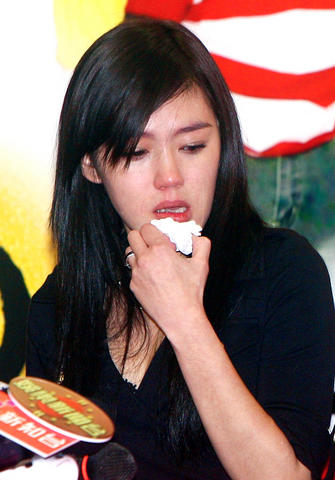The most embarrassing moment in the Golden Bell Awards' (金鐘獎) 42-year history came to light on Monday when the jury panel confessed that a top honor, the Best Supporting Actor accolade, was awarded to the wrong person at the ceremony on Saturday. The real winner was Hong Kong-based Chang Chia-nien (張嘉年), also known as Tai Pao (太保), not veteran actor Chang Kuo-chu (張國柱).
Jury committee convener Wang Chang-an (王長安) explained that the two nominees' similar-sounding names confused the awards ceremony presenter, which is the same as saying, "Oops, we handed the envelope to the wrong person."
What showbiz pundits are wondering is how badly the jury members squirmed on the night of the awards ceremony, which was televised live.

PHOTO: COURTESY OF CTV
An anonymous source, quoted in the Chinese-language press, claims jury members were called back for an emergency meeting during the ceremony. Official statements indicate the jury assembled on Sunday to formulate a damage-control policy and came up with a solution that was supposed to make everyone happy: the award goes to both Changs.
Gracefully accepting the trophy that didn't actually belong to him, Chang Kuo-chu couldn't help but voice his discontent by saying to the local press: "Rather than a celebration party, I'll just treat everyone to a bowl of Udon noodles [Udon is written as 烏龍 in Chinese, a term that means 'daft mistake']."
A third wave of police raids on celebrities suspected of using drugs officially began last week when newly crowned showbiz caner Suzanne Hsiao (蕭淑慎) was busted with 30.4g of cocaine, 2g of ketamine and drug paraphernalia sitting in her rented apartment. Shortly after Hsiao's arrest, starlet Pei Lin (裴琳) was brought to the police station and confessed to having been puffing the magic dragon for a couple of years.

PHOTO: TAIPEI TIMES
Prosecutors hinted that there are at least three more female stars and two basketball players on their to-bust list, which promises more grist for the media mill.
A new computer game (ent.163.com/special/000327LU/ziyibaolian.html) puts into action the ongoing speculation on the unspoken rivalry between Chinese stars Zhang Ziyi (章子怡) and Tang Wei (湯唯). The aim of the game is simple: Zhang has to kick Tang out of her way on the red carpet in order to give Ang Lee (李安) a hug.
The inspiration comes from Zhang's well-known complaint that Lee didn't give her a hug of encouragement during the shooting of Crouching Tiger, Hidden Dragon (臥虎藏龍) while Tang has been the center of Lee's countless praises.
In other film-related news, with John Woo's (吳宇森) epic period drama Red Cliff (赤壁) nearing the end of shootng this month, China Central Television last Saturday took the lead in examining the big-budget, Asian-financed film and revealed details of the movie's star-studded cast, which didn't score well with the Chinese Net-using public.
It is opined that Tony Leung (梁朝偉) looks too old to play the character Chou Yu (周瑜) and Takashi Kaneshiro (金城武) too sissy for Chu-ko Liang's (諸葛亮) part. Chang Chen (張震), however, stands out from the crowd for his insidious enough looks to bring Sun-chuan (孫權) to the big screen.

April 14 to April 20 In March 1947, Sising Katadrepan urged the government to drop the “high mountain people” (高山族) designation for Indigenous Taiwanese and refer to them as “Taiwan people” (台灣族). He considered the term derogatory, arguing that it made them sound like animals. The Taiwan Provincial Government agreed to stop using the term, stating that Indigenous Taiwanese suffered all sorts of discrimination and oppression under the Japanese and were forced to live in the mountains as outsiders to society. Now, under the new regime, they would be seen as equals, thus they should be henceforth

Last week, the the National Immigration Agency (NIA) told the legislature that more than 10,000 naturalized Taiwanese citizens from the People’s Republic of China (PRC) risked having their citizenship revoked if they failed to provide proof that they had renounced their Chinese household registration within the next three months. Renunciation is required under the Act Governing Relations Between the People of the Taiwan Area and the Mainland Area (臺灣地區與大陸地區人民關係條例), as amended in 2004, though it was only a legal requirement after 2000. Prior to that, it had been only an administrative requirement since the Nationality Act (國籍法) was established in

With over 80 works on display, this is Louise Bourgeois’ first solo show in Taiwan. Visitors are invited to traverse her world of love and hate, vengeance and acceptance, trauma and reconciliation. Dominating the entrance, the nine-foot-tall Crouching Spider (2003) greets visitors. The creature looms behind the glass facade, symbolic protector and gatekeeper to the intimate journey ahead. Bourgeois, best known for her giant spider sculptures, is one of the most influential artist of the twentieth century. Blending vulnerability and defiance through themes of sexuality, trauma and identity, her work reshaped the landscape of contemporary art with fearless honesty. “People are influenced by

The remains of this Japanese-era trail designed to protect the camphor industry make for a scenic day-hike, a fascinating overnight hike or a challenging multi-day adventure Maolin District (茂林) in Kaohsiung is well known for beautiful roadside scenery, waterfalls, the annual butterfly migration and indigenous culture. A lesser known but worthwhile destination here lies along the very top of the valley: the Liugui Security Path (六龜警備道). This relic of the Japanese era once isolated the Maolin valley from the outside world but now serves to draw tourists in. The path originally ran for about 50km, but not all of this trail is still easily walkable. The nicest section for a simple day hike is the heavily trafficked southern section above Maolin and Wanshan (萬山) villages. Remains of